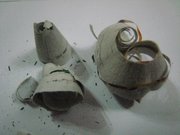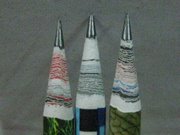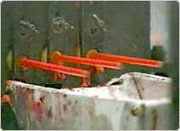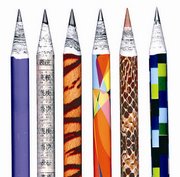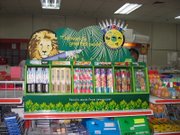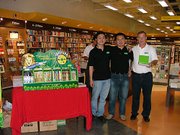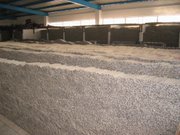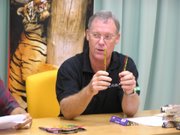Sunday, February 24, 2008
Say "NO" to Wood Pencils
I wrote these comments to help people understand who we are and what our products are all about...
I really like this discussion and particularly the article and the comments from Boris. All make for an interesting read.
Please know that the Chinese are the inventor of this process; therefore, this is the reason that the process is not yet in the US. Second, there are a lot of - I mean - a lot of not good recycled newspaper pencils being made in China. O'BON is the biggest and the only one with both ISO 9001 and ISO 14001 certification. Our factory is clean and extremely mindful of the environment. Our byproduct is a newspaper particles produced by grinding the rough edges. This is sucked up and filtered in a tank. The contents of which are put in our garden as mulch. Cool.
Our factory is extremely low on the energy consumption scale in producing pencils. Unlike wood penclis, we have no trees to chop, no wood slates to grind, no hexagonal shapes to made by grinding the woods. Also notice we use no ferrel aluminium - trying to reduce our footprint. We would love to have a discussion about our factory and energy production, waster, impact compared to the wood pencil producers. This is a comparison our plant will win hands down.
People who have used recycled newspaper pencils have come away unhappy doesn't surprise us. Most of the factories producing these pencils are rip offs. Be careful, but O'BON is a brand. As a brand, we are here to stay and are committed to improving our product. We do this by listening to all complaints and especially enjoy engaging in these kinds of debates. O'BON is completely non toxic - we have EN-71 certification (kid toy safe cert) while others will not as they are not a brand.
The issue of whether we are eco-friendly as newspaper comes from trees is an interesting argument. We would contend that the large pencil companies have invested huge amounts of money and resources in reducing bio-diverse forests to produce their sustainable forests. These forests are huge and often primary forest are cut to produce them. This has happened in Brazil, Malaysia, Indonesia and the Phillipines. This maddens me as to tear down a primary forest to create a sustainable forest - and then claim that you are environmental is deception at best. O'BON strives to reduce these sustainable forests and eliminate the practice of making pencils from trees. To us, it seems so old fashioned as there is better technology to make a pencil.
I save the best for last: Why are our pencils better than wood pencils. Some people seem to be incredulous about our claim of lasting 3 times longer. How is this possible? The graphite is the same, the length is the same, what are blatant lie you may think. Let me explain.
Unlike wood pencils which are made by gluing two slates of wood together, O'BON uses newspaper, wrapped tightly. Wood pencil slates are grooved to hold the graphite and then glued tight. There is almost always air gaps in this process. So, as every young student learns, wood pencil graphite easily breaks when dropped. Often it shatters all the way up to the eraser. So when you sharpen such a pencil, the graphite is cracked resulting in breakage. This is so frustrating and an extremely common event. Just ask any child.
Now, take our O'BON pencils. Smash it on the desk. I mean really smash it, over and over and over. Now sharpen it. Wow, not broken. Try this experiment with any wood pencil. In our road shows and exhibition we love to invite people to drop or smash our pencils - they just don't break. Audiences are amazed. (Other recycled newspaper pencils will withstand this punishment, but O'BON pencils will. So, with our superior manufacturing technique - and our exclusive tight roll-on method, our graphite will not crack. Don't believe, buy a box and try it. Now if you snap the pencil in two, the graphite will break as well...Duh!
It is this fact regarding our non-breakable graphite (when pencil is dropped or snapped) that leads us to our claim of lasting longer than wood pencil. We stand by our claim and ask you to investigate.
Wednesday, October 10, 2007
Fruit Pencils - O'BONanza
The packaging again in award winning. This time, we go cube. 9, 2B pencils tucked nicely in the cube box. Cute. Come back next week.
Saturday, September 22, 2007
Ring Binders
Monday, June 25, 2007
The Eco-Utopian Revolution
The turn of the 21st century has been marked by the greatest challenge the human species has ever faced. Over the next few decades, our generation will be entrusted with the colossal responsibility of erasing mankind’s impending path to self-destruction. The damage we have wreaked upon this planet is substantial, and no matter what many of us are told to believe, I implore you to accept the deadly seriousness of this problem.
Essentially, the environmental crisis exists on two different levels. The first is rather obvious: our direct contribution, in the form of garbage and fuel emissions, logging and burning.
Today, we know we live on a planet with finite resources. Our consumption of materials is brutally taxing on the natural world. Humans simply cannot afford to have an insatiable appetite. If the entire world lived like the average American, we would need three earths to meet the demands imposed. And while some of us may frown at American culture, for many people it is sadly the social and economical ideal.
Still, the second problem may be even more worrying: human denial. Our ability to conveniently turn a blind eye to what we know in our hearts to be true is extremely disconcerting.
Few people today could scientifically challenge the existence of global warming (it was discovered recently that the central argument by opponents of global warming was based on incorrect data). Many shrug it off, however, unable to deal with the uncomfortable notion that the earth is being destroyed in front of their very eyes. The reality, as with any problem that we face as individuals, remains the same: the sooner we accept, the quicker we repair.
Others downplay the significance of the problem. Ignore them. The problem is huge, and it is staring us straight in the face. We just need to open our eyes and look for ourselves. Hurricane Katrina, like any of the dozens of hurricanes that form year round, was a natural phenomenon. Yet many scientists today argue that the severity and strength of such storms are dependent upon heat energy from the ocean, and human beings, through the process of global warming, are heating the ocean faster and faster.
If the fact that hurricane occurrences have nearly doubled in the last five years does nothing to convince you, there are other examples. Coral reefs, extremely dependent on cool, precise water temperatures, have been projected to disappear completely in as few as 20 years.
Biodiversity is being destroyed at a rate rapid enough to be labeled an “era of extinction.” High contents of mercury found in marine fish, such as tuna, routinely make people sick. To date, there are 146 “dead zones” (some up to 70,000 square kilometers in size) in the world’s oceans where marine life simply cannot exist.
In fact, we Malaysians should understand the severity of environmental destruction better than most, having recently been on the receiving end of disgusting levels of haze, a product of the forest fires in
One of
Part of this process of understanding the problem must include understanding the consequences of inaction. This catastrophe affects each and every one of us dramatically, whether we notice it or not. Do we not all love clean water, fresh air and healthy life? These fundamentals, which many of us take for granted, are disappearing rapidly.
Every day, people and animals die because of how we live our lives, polluting and over-consuming. When a crisis threatens our very existence, do we not have a responsibility to unite and respond?
If you dare ask why we should care about the state of our world long after we are gone, my response would be simple: It is a good thing the people before us didn’t adopt the same attitude towards you.
Unfortunately, the first hurdle of accepting our situation is also the easiest. Complaining about our situation often seems natural, yet it serves no useful purpose. Changing the way we behave is a difficult but vital step in the right direction. The harsh reality is that improving the state of our planet cannot happen without sustained effort at the individual level. We will have to roll up our sleeves, get dirty and teach ourselves to overcome this mess.
It all starts with simple acts, from turning off lights to learning how to recycle, from writing your local newspaper to discussing this plight with your friends and family.
I understand how insignificant these small, troublesome acts must appear. Many will ask, “What difference can I possibly make?” Always remember that every revolution begins with the smallest of sparks, and we are taking part in possibly the most important social movement history has ever seen.
It is an enormous challenge but each and every one of us, with the proper approach, can contribute significantly to its success. In the words of environmentalist Lester B. Milbrath: “Those who understand what is happening to our world are not free to shrink from this responsibility.” Whether we like it or not, this knowledge bestows upon us a moral duty to protect this stunning planet.
This understanding has never been more important than it is today. In one of my recent university classes, a fellow classmate likened the environmental crisis to a speeding train, heading towards the edge of a cliff.
Today, we suffocate and pollute ourselves more than ever before. Granted, slamming on the brakes may not reward us immediately. It will take time to completely stop. However, consider the dire consequences of doing nothing at all. The fall will be excruciatingly painful.
Saturday, June 16, 2007
"The times they are a changing..."

The wood pencil hasn't changed much in the last 400 years! Many manufacturers have even kept the same color - yellow. At O'BON we have changed all that. First we don't start with a tree, we start with a discarded morning newspaper. Rolling it up with our special water based glue means that O'BON pencils are as strong as wood, but so much easier than wood to sharpen. Six pencils can be made from one sheet of the New York Times. So, let's save our trees and use recycled O'BON newspaper pencils or pens.
Monday, June 11, 2007
Superior Writing Experience


O'BON pencils are clearly unique. Each pencil carefully crafted to provide you with a superior writing experience. Our graphite is of the highest quality as are the designs. "Out" are the boring yellow, blue or red pencils of your parents' generation. "In" are rich colors and designs which excite.
Our pencils are made from recycled newspaper as this is the logical evolution in the manufacturing of a pencil. Cut down a tree, a precious tree, to make a pencil. We think not!

 click to read
click to read
